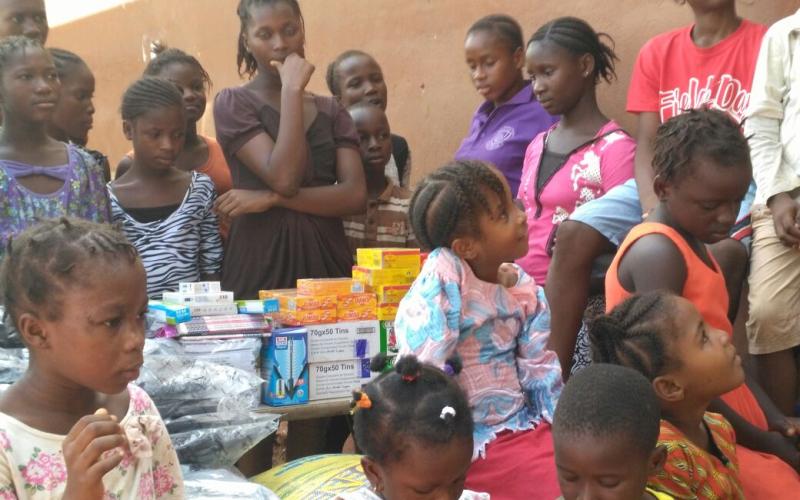
I don’t remember the war in Sierra Leone but in the grimmest days of Ebola you heard people saying: “This is worse than the war.” At least in the war, you could see your enemy. And after the war Sierra Leone had a lot of help. We need help like that now. Over the past year, there have been so many foreigners and NGO workers. And even though the main reason Ebola is over is because of the changes we made, these people did help us. But in Kenema today you can hardly see a white person. I wonder if we have been forgotten?
We learned how to stop giving Ebola to each other. We changed habits. We have stopped touching each other, stopped even touching the corpses of our loved ones at funerals. Even the sowies (traditional ladies who conduct the bondu initiation ceremonies that involve cutting) have stopped.
We learned new words. For me, the worst is quarantine: it means prison. Can you imagine? There is no war but men with guns and uniforms stand outside the homes of your friends. One day, there were soldiers outside my own house. My aunty caught Ebola. She was taken away and quarantine began on my very veranda. Like most in Kenema, we are poor and hardly ever have more than a few days food in the house – then you are suddenIy trapped for 21 days.
I know girls who crept out of their houses at night and slept with men for food – now there are many of these babies in Kenema today. This is another of our problems after Ebola. What will become of them I don’t know; these are girls like me who can hardly afford to look after themselves. The ambulances that took people away never seemed to return, even to tell people what had happened to their loved ones or even with their bodies for burial. I know one family who have only just given up hope that their boy was coming back.
But yes, we were the “lucky ones”. Finally, after a month at home, we heard that Aunty was still alive. Ebola had left her. Aunty was weak and tired but alive. I would not become an orphan.
We thought that life would be normal again, but it wasn’t. The community was scared that my aunty had returned and people were calling us Ebola Children. They wouldn’t let us play with other children. It was like another prison. Our people, my friends – they all feared us. In the end, we decided we should move away. It was all we could do and, at last, the stigma (another new word I had learned) came to end. We found some peace.
Life was easier but we still struggled for food. My aunty’s savings had been spent on food and medicine. Our possessions were burned as part of disinfection. Now we had so little money. Slowly, as Aunty grew stronger, we made a small garden and planted potatoes, which I would sell in town. This helped but there were days with no sales.
All schools in the country were closed for nine months. I was unhappy not to be learning. For some of my friends, with nothing to keep them busy they found trouble. More girls got pregnant. When almost all hope of going back to school was gone, the charity Street Child provided us with a grant so that Aunty could restart in business and supported me in going back to school.
The classrooms were almost empty. Some still are, especially in the villages. In Sierra Leone, girls who fall pregnant hardly ever return to school.
In fact, so many children are struggling. The most wretched are the orphans. Some have been taken in by kind families; others are hardly cared for. In fact, there are some families where children my age are in charge.
It is girls who suffer most. When cash is short at home, we are the ones families don’t send to school. Those with babies struggle to care for them and the men deny they are the fathers or never show up. Some girls are even driven from home to live on their own.
But the biggest problem facing us after Ebola is bigger poverty. We were poor before but Ebola made it all worst. But if things can get better for me and my family, as they are, I know they can improve for others too. But we can’t do it alone. We all still need a lot of help.
www.street-child.co.uk
Source: http://www.theguardian.com/commentisfree/2015/oct/18/sierra-leone-ebola-aftermath-west-help-needed

